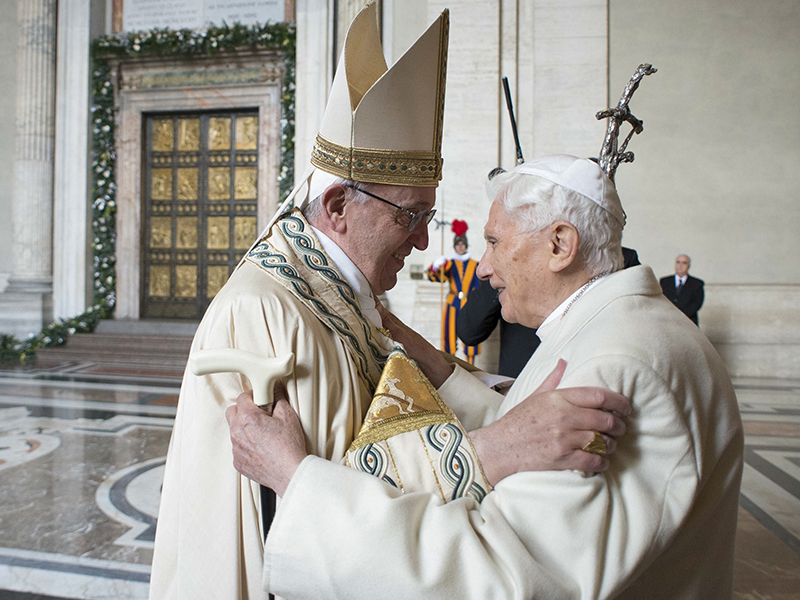
Pope Francis, left, embraces Emeritus Pope Benedict XVI before opening the Holy Door to mark the opening of the Catholic Holy Year, or Jubilee, in St. Peter's Basilica, at the Vatican, on Dec. 8, 2015. (Osservatore Romano/Handout via Reuters)
Conservative Catholic dissidents, who have been attacking Pope Francis, showed their true colors recently by attacking retired Pope Benedict XVI, calling his writings "subversive" and "modernist." That's right, they think Benedict is a heretic.
In his new book, "Al Cuore di Ratzinger, Al Cuore del Mondo," the Italian philosopher Enrico Maria Radaelli goes after Joseph Ratzinger’s "Introduction to Christianity," one of Pope Benedict’s most popular books. Radaelli accuses him of embracing modern subjectivism by dabbling in Kant’s transcendentalism and Hegel’s "dialectical idealism."
Radaelli is joined in this attack by Monsignor Antonio Livi, dean emeritus of the faculty of philosophy of the Pontifical Lateran University. What is noteworthy is that last summer both of these academics signed a letter of correction addressed to Pope Francis asking him to change his "erroneous" views.
These folks are unhappy with everything that has happened in the church since the death of Pius XII in 1958 and the reforms of the Second Vatican Council in the 1960s.
Livi thinks that "neo-modernist" theology (a slur used by conservatives to describe anything they don't like) has enveloped the church, infiltrating its seminaries, bishops' conferences and even the Vatican itself. This "heretical" view has infected all the documents of Vatican II and the teachings of post-conciliar popes, Livi argues.
The problem with these philosophers is that they see the world as ideologues with rigid categories and rules. They have absolute certitude in their views and are not open to new questions. They are incapable of dialogue or learning from others.
They remind me of the joke: What is the difference between a scientist and a philosopher? If a scientist’s theory does not fit reality, he changes his theory. If a philosopher’s theory does not fit reality, reality must change.
Luckily, Pope Francis does not take these critics seriously. In a talk to the Italian Theological Association on Friday (Dec. 29), he laid out what he believes is the true vocation of a theologian. Theologians must always refer back to Vatican II, where the church recognized its responsibility to "proclaim the Gospel in a new way."
The pope spoke of “faithful creativity” in responding to a rapidly changing world. The job of a theologian is to show people what lies at the heart of the Gospel.
"There is need of a theology that helps all Christians to proclaim and to show, above all, the saving face of God, the merciful God," he said, "especially in the presence of some unheard-of challenges that involve the human today.” Among these challenges, he listed the environmental crisis, technologies that can alter human beings, social inequalities, mass migration and relativism in theory and practice.
He even calls on theologians to work together to "reimagine the church so that it may conform to the Gospel that it must proclaim."
The problem with conservatives is that they treat the great theologians of the past as a treasure chest of quotes rather than as examples of how to do theology. St. Augustine, for example, took Neoplatonism, the elite philosophical thought of his period, and used it to explain Christianity to the people of his age. St. Thomas Aquinas took the newly rediscovered writings of Aristotle — the avant-garde thinking of his time — and used it to explain Christianity to his 13th-century contemporaries.
The task of theologians is not to simply quote Augustine and Aquinas but to imitate them, to take the best secular thought of our time and use it to explain Christianity to 21st-century men and women. After all, how many Neoplatonists or Aristotelians have you met lately? Do we really expect contemporary people to master Plato and Aristotle before we can talk to them about Christ?
Sadly, the church does expect seminarians to learn Greek philosophy before studying theology, which results in them spouting unintelligible concepts like “transubstantiation” and “consubstantial.”
Advertisement
What theology needs today are thinkers like Augustine and Thomas who want to engage the thinkers of today, not yesteryear. Such creative thinking can get you in trouble in the church. Thomas’ books were burned by the bishop of Paris. Likewise, in the last century, creative theologians were persecuted and silenced by the hierarchy. Thankfully, Pope Francis is not afraid of theological creativity. In fact, he encourages the theological discussion and debate that are essential to the development of theology.
Catholic conservatives were brought up in a church that presented itself as unchanging because in Greek philosophy the perfect cannot change. Such an approach is not only ahistorical, it is doomed to failure. When such conservatives not only attack Pope Francis but also Benedict, they show that they are true ideologues, out of touch with reality, who should not be taken seriously.
[Jesuit Fr. Thomas Reese is a columnist for Religion News Service and author of Inside the Vatican: The Politics and Organization of the Catholic Church.]







